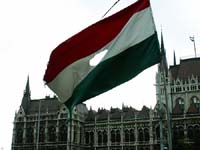U.N. refugee chief marks 1956 uprising by urging greater action on today's refugees
The 50th anniversary of Hungary's anti-Soviet uprising, which forced 200,000 people to flee the country, should serve as a reminder of the world's need to generously aid victims of political persecution, the U.N. refugee chief said Monday.

"Unfortunately, today we are witnessing situations in which the amount of suffering is much greater than what we saw in Budapest and the indifference is also much greater," said Antonio Guterres, the U.N. high commissioner for refugees.
Guterres did not mention any current refugee crisis. UNHCR has criticized European countries for making it difficult for asylum seekers fleeing from conflict zones, such as in Iraq or Sudan's western region of Darfur.
The global refugee body marked the Hungarian uprising's anniversary by remembering the "massive effort" of aid agencies and neighboring countries to help Hungarians who escaped across the border to either Austria or Yugoslavia.
It noted, in particular, the work of Austrians to help care for the refugees and enable some 180,000 to establish permanent residence in other countries, but said the world seems five decades later "much less inclined to respond with such spontaneous hospitality."
"The international community must be prepared in a generous, open way to deal with refugee problems," Guterres said in a statement. "Problems like that will continue happening time and time again."
Several events were being held Monday in Budapest for the anniversary of the start of the uprising, including the unveiling of a large memorial near the spot where an 18-meter-high (60-foot-high) statue of Stalin was toppled and cut into pieces.
Around 2,800 Hungarians and 700 Soviet troops were killed when the 1956 revolution was crushed by Red Army troops. After the military defeat, strikes and protests continued for several weeks until a Soviet crackdown definitively ended the uprising in January 1957, reports AP.
At the time of the uprising, UNHCR only had a temporary mandate and was scheduled to expire in 1958. It was established by the U.N. General Assembly in 1950 to deal with the millions of European refugees left over from World War II.
The resettlement program for Hungarians was the first major refugee relief operation of its kind. International asylum laws were still only partly written and never before had a national or ethnic group been granted immediate refugee status without each person having to be assessed individually which the Geneva-based agency credits with benefiting tens of millions of refugees since.
"Both governments and people were tremendously committed to help the people fleeing from Hungary at that time," Guterres said. "It was the first movement in which refugees were recognized en masse. We had 100,000 people resettled in the first 10 weeks which I think is inconceivable today."
Subscribe to Pravda.Ru Telegram channel, Facebook, RSS!




